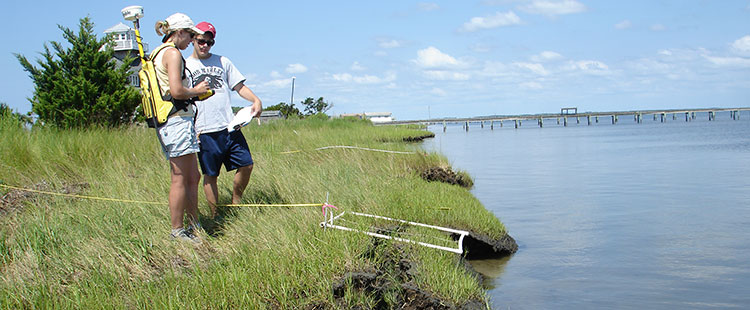Climate Impacts
 NCCOS researcher and student volunteer map vegetation density on Harkers Island, NC. Portions of this shore have experienced significant erosion of the salt marsh, and are at risk to further erosion from storm surges or sea level rise.
NCCOS researcher and student volunteer map vegetation density on Harkers Island, NC. Portions of this shore have experienced significant erosion of the salt marsh, and are at risk to further erosion from storm surges or sea level rise.
Encouraging coastal adaptation through research and restoration
Our coasts are high energy environments, subjected to marine, terrestrial and meteorological forces. This makes them incredibly productive - over 150 million Americans live and work within our coastal areas, contributing $7.9 trillion to the U.S. economy.
NCCOS research aims to understand how, and anticipate when and where, climate-induced changes may disrupt coastal communities, property, and economies. We are improving our understanding of how changing weather (storms, droughts) and sea level rise will impact coastal ecosystems. We also model how coastal ecosystems will respond to climate change and evaluate approaches for preserving and protecting coastal habitats. Communities use the outcomes of our research to plan for, adapt to, and increase their resilience to threats posed by potentially damaging climate conditions.
The impacts of climate variability and change are increasing in coastal zones. Air and water temperatures are higher and we are seeing changes in the seasonality and amounts of precipitation, frequency and severity of storms, sea level rise, and the acidification of ocean waters. These climate-related impacts exacerbate existing challenges to coastal regions. For example, climate change is projected to accelerate sea level rise in many areas of the nation, which will exacerbate coastal flooding during storms.
Direct impacts to human populations can include lost property and recreational opportunities due to eroding shorelines and beaches, higher costs to treat increasingly polluted water, and rising health care costs associated with an increase in disease vectors. Fish and shellfish may be adversely impacted by the loss of coastal wetlands and marine habitats.
NCCOS Climate Impacts research is focused on the following subjects and programs.